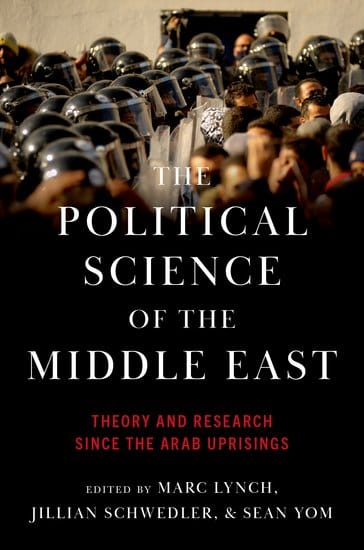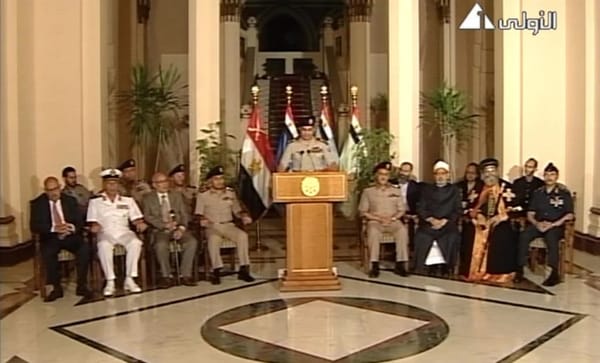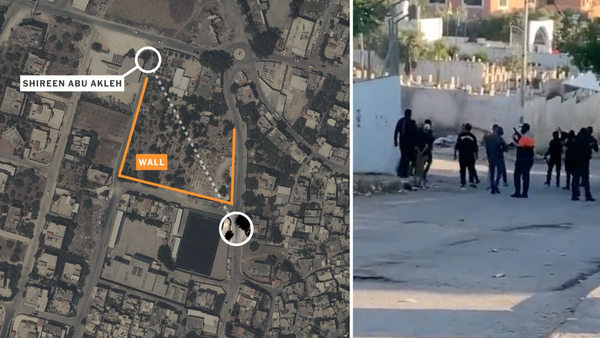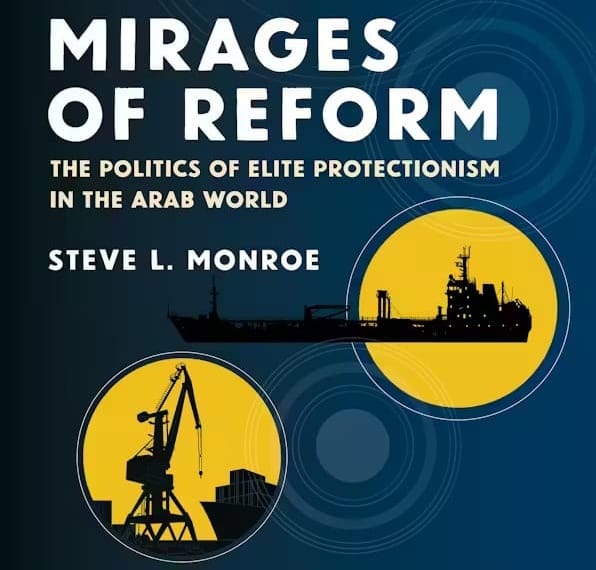Higher education is facing omnicrisis. Is your syllabus done?

Maybe I can help.
The first of August is the traditional breaking point for academics to suddenly realize that despite the scorching temperatures the summer is rapidly coming to an end. The coming semester is going to be deeply challenging for all of us, and especially for those of us who teach about the Middle East. It was always clear, as I wrote repeatedly over the last year, that alleged antisemitism would be used as a wedge to drive home a much broader assault on higher education; here we are.
We've seen the abrupt political cancellation of federal grants and the freezing of other grants as a pressure tactic on universities, all causing massive disruption and pain while devastating virtually all streams of American scientific and humanities research for no purpose whatsoever. Almost every school is bracing for fiscal crisis with hiring freezes, layoffs, and other austerity measures reminiscent of the COVID era but worse since it's entirely politically and intentionally inflicted.
In the face of this political assault, we've been watching the steady stream of capitulation deals made by elite universities - Columbia's disgraceful full-throated embrace of Trumpist demands; Harvard's reported moving away from fighting back towards a $500 million payoff along with its already implemented programmatic changes; Brown's shocking agreement to add questions about alleged antisemitism into anonymous course evaluations, obviously practically begging for unverifiable political claims against faculty and graduate students. We've seen more and more universities adopt the IHRA definition of antisemitism, which effectively conflates it with any criticism of Israel, as part of their craven efforts to appease the administration. Rashid Khalidi has one of the best pieces I've yet seen laying out how all of this makes it virtually impossible to teach honestly or have open and free discussions about anything related to the Middle East.
We've all watched in horror as students who criticized the genocidal campaign in Gaza have been arrested, imprisoned, abused and threatened with deportation – many, as we now know, based on their inclusion on lists compiled by extremist right wing groups and funneled to the government. We've watched the choking off of international student visas and the State Department declarations that it will monitor the social media feeds of those who make it for evidence of any criticism of Israel (not even of Trump). Many observers are finally waking up to a new reality in which the criminalization of DEI has made pro-Israel students vitually the only protected class on campuses (not "Jewish students", since majorities of Jewish students and faculty at most campuses tend to be just as critical of Israel's devastation of Gaza as any other students).
This is not just another round of the free speech wars (not that the self-proclaimed free speech warriors much care - most of them seem thrilled to see state power crushing their political enemies and silencing speech they dislike). This is about the literal, not figurative, criminalization of teaching, speaking, and publishing about the Middle East in any way that doesn't conform with the official proscribed ideology. And with that wedge firmly lodged in place, it will be the template for destroying any other line of intellectual inquiry which displeases the political commissars who have been ceded such unprecedented authority over our colleges and universities.
It's going to get worse this fall, not better. Please give a moment of appreciation to the Middle East Studies Association and the American Association of University Professors for their dogged efforts to fight back – in too many instances almost completely on their own. Let's hope that the combination of the growing recognition of the reality of Israel's starvation and mass killing in Gaza with the growing understanding that the assault on higher education has little to do with actual antisemitism will enable some more broadly based and effective pushback before it's too late.
But I'm afraid that this doesn't get professors off the hook for uploading fall syllabi over the next few weeks. And with that at least, I'm here to help. If you are teaching a course on the Middle East this semester, here are a few recent publications by me and by the POMEPS network which I think should fit very nicely into many syllabi and definitely absolutely for sure not draw the attention of any political commissars or watchdogs:
Marc Lynch, Jillian Schwedler and Sean Yom, eds., The Political Science of the Middle East (Oxford). This collaborative work bringing together nearly fifty of the top scholars of Middle East politics to survey the state of the field a decade after the Arab uprisings remains one of the best possible overviews for advanced undergraduates or graduate students. More specialized classes could use individual chapters on everything from International Relations to protests and social movements to restructured authoritarianism to migration and refugees. There's also a full set of podcast recordings with the authors of each chapter which could be assigned along with the reading.
Marc Lynch, What is the Middle East?: The Theory and Practice of Regions (Cambridge). I wrote this short Cambridge Element in part to satisfy my own need for something to assign in the opening weeks of my courses on IR of the Middle East and my scope and methods in Middle East Studies course. It's short, readable, and hopefully as entertaining as it is informative as it examines the origins of competing definitions of the Middle East, the implications of those definitions for both policy and research, and the possible alternatives. If you don't have access, I will happily (and legally) share a PDF.
Social Science Research in the Middle East and North Africa. The REMENA project recently released both a set of guidelines for ethical research and a collection of articles in Daedalus which explore questions of ethics from a wide range of perspectives. These should be eye-opening and even transformative for many students – and not only those doing Middle East Studies, since the issues are global.
Making Sense of the Arab State (Michigan). Steven Heydemann and my recent edited volume brings together an outstanding group of scholars to examine different theoretical and empirical approaches to that ever-central political science conceptual question. It aims to engage a broad political science audience, not just Middle East experts, and would fit well in a wide range of comparative politics syllabi. It's also fully open access!
The One State Reality: What is Israel/Palestine? (Cornell). Edited and introduced by Michael Barnett, Nathan Brown, Shibley Telhami and myself (I wrote the conclusion as well), featuring a stellar group of Israeli, Palestinian, and international scholars. Published before October 7 and the destruction of Gaza, the book digs into the political, institutional, international, and cultural dimensions of the political system which actually existed between the Jordan River and the Mediterranean. Not all authors agreed with the premise that the two state solution has become impossible, but all shared a determination to look honestly and deeply at Israel/Palestine as it actually existed and where it seemed to be going. This is the one that most definitely shouldn't be at all controversial on any syllabus and certainly won't get you into any trouble with any of the watchdogs mentioned above. That would be inconceivable.
If you don't want to use books or book chapters, allow me to recommend POMEPS Studies. We just released the 56th volume of our open access publication. These collections are optimized for classroom use: completely open access, short essays of about 3000 words, diverse perspectives on the issue's theme, a mix of junior and senior scholars, rigorously edited and polished to be accessible to a broad audience, and often co-organized with extremely excellent colleagues. You can peruse the full list of POMEPS Studies collections here. Here's some highlights for last minute syllabus builders:
- International Relations: Regional Order Making After October 7 (July 2025) - super timely look at regional international relations; Debating American Primacy in the Middle East (February 2025); Shifting Global Politics and the Middle East (September 2019); Transnational Diffusion and Authoritarian Cooperation (August 2018)
- Comparative Politics: A lot of candidates, but highlights include State and Regime Violence (May 2025); Digital Activism and Authoritarian Adaptation (August 2021); Challenges to the Inclusionary State (February 2020); From Mobilization to Counter-Revolution (July 2016); On political economy issues, don't miss The Politics of Rentier States in the Gulf (January 2019), Social Policy in the Middle East and North Africa and Labor and Politics in the Middle East.
- Islamist Movements: We have a genuinely vast catalog of studies of religion and politics, especially Islamist movements.
- More Specialized Course Topics: Women and Gender in Middle East Politics; Refugees and Migration Movements in the Middle East and The Politics of Migration and Refugee Rentierism; Youth Politics in the Middle East and North Africa; Environmental Politics in the Middle East; Urban Politics in the Middle East
- What Even is the Middle East, Anyway? If my book above isn't enough, definitely have your students check out Africa and the Middle East: Beyond the Divides (one of our most downloaded publications ever), Racial Formations in the Middle East and Africa: A Transregional Approach, and Race Politics and Colonial Legacies: France, Africa and the Middle East.
There are of course many, many other books, articles, and collections I could recommend - my own and by others. My podcast featuring interviews with authors is a great resource for discovering new books on Middle East politics, and for assigning to students alongside those books - check out the full episode list here. Hopefully these suggestions will spark some ideas for how to freshen up your syllabus for the fall or build one from scratch.



